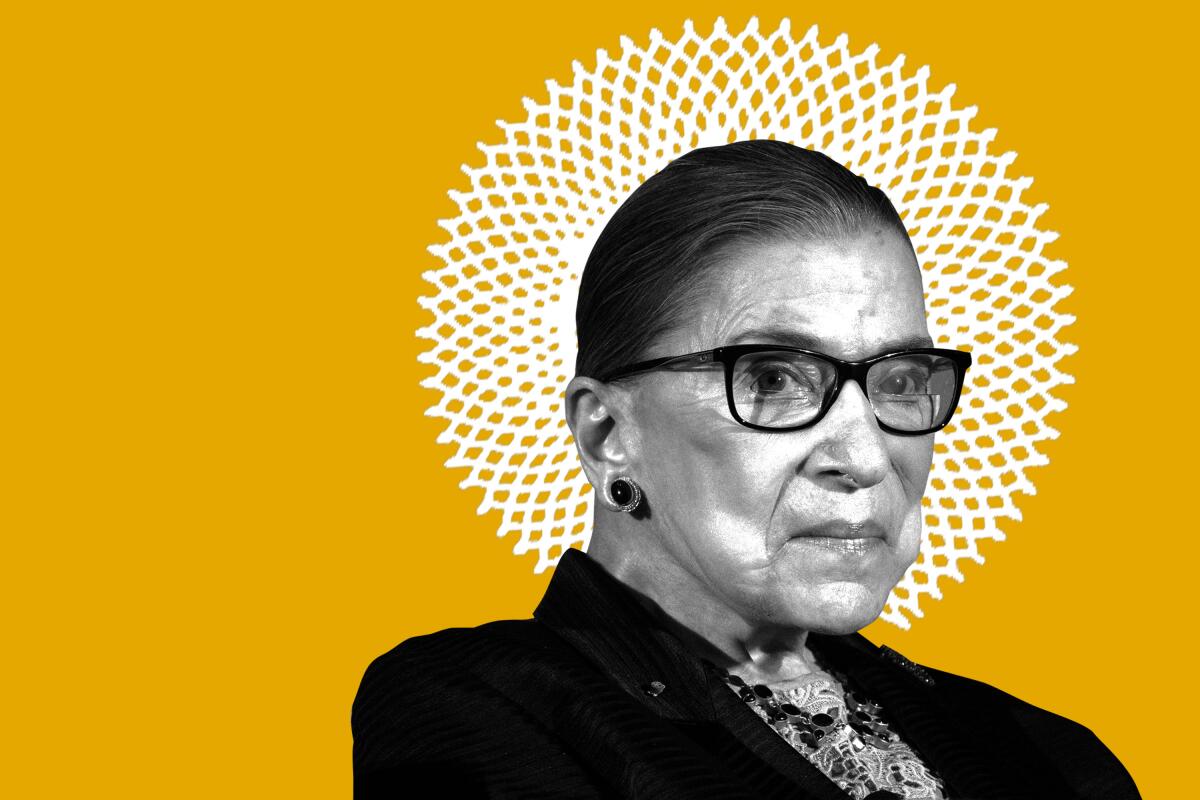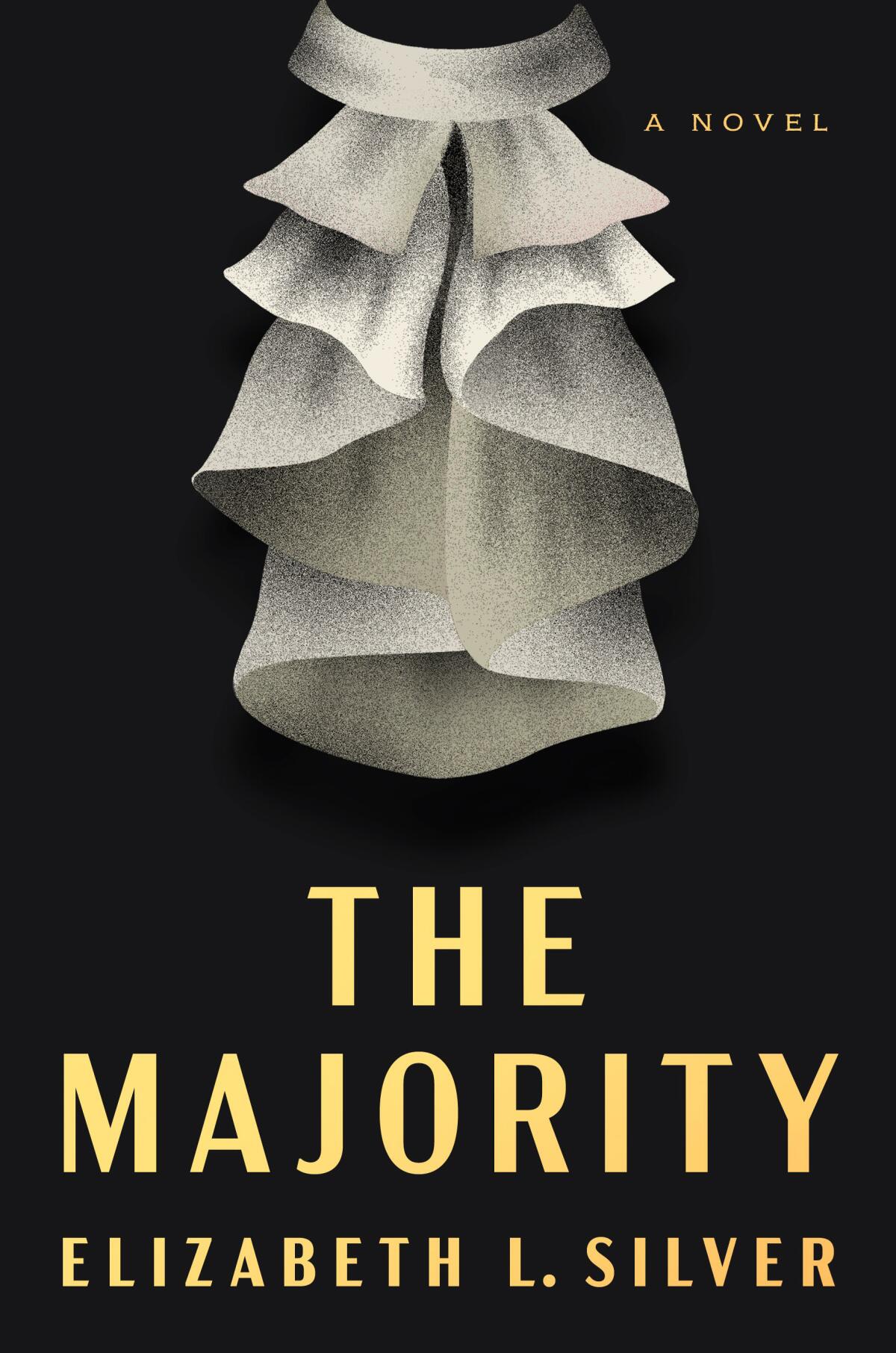A novelization of RBG’s life reminds us what the Supreme Court once stood for

- Share via
Review
'The Majority'
By Elizabeth L. Silver
Riverhead: 384 pages, $28
If you buy books linked on our site, The Times may earn a commission from Bookshop.org, whose fees support independent bookstores.
Last week marked an irrevocable turning point for the U.S. Supreme Court — and our nation. In a flurry of late-session 6-3 decisions, the court’s conservative majority eliminated the right to affirmative action in college admissions, allowed businesses to discriminate against LGBTQ+ people, and struck down President Biden’s student-loan forgiveness plan. Just a year after the federal right to an abortion was overturned, these rulings also followed news that two justices had accepted lavish gifts from billionaires with business before the court.
This turn of events is even sharper (and to many, more painful) when you consider how recently it felt like the Supreme Court — albeit by slim margins — was expanding the rights of Americans, thanks in part to a beloved jurist whose pioneering biography paralleled the pathbreaking cases she decided. Ruth Bader Ginsburg, idolized as the “Notorious RBG,” died less than three years ago.
But her legend lives on, most recently in Elizabeth Silver’s new novel, “The Majority.” Its RBG-esque protagonist, Sylvia Olin Bernstein, 83, considers her life as she looks back to her decades on the highest court. “Half of the United States is waiting for me to die,” she writes in a note. “The other half stand by, candles in hand, praying for me to hang on.”
The Supreme Court’s student loan debt-relief ruling may cause even more harm than its affirmative action decision. What we need is a truth commission, writes UCLA’s Marcus Anthony Hunter.
Before she became one of “The Nine,” Justice Bernstein was one of another famous nonet: the first group of women admitted to Harvard Law School in the 1950s. The tension between her membership in those two groups will determine much of her life’s progress. Sylvia — Sylvie to her nearest and dearest — has a strong liberal, feminist bent, which she slowly realizes in this stealthily devastating story puts her at odds with much of her country and even her family.

Due to an early mistake leading to a short jail stay for contempt of court, Sylvie becomes known as the “Contemptuous S.O.B.” This winking reference notwithstanding, the author departs liberally from Ginsburg’s well-known and oft-dramatized biography. The differences start early and pile up quickly. Sylvie, whose parents run a small Brooklyn deli, grows up with a cousin, Mariana. Mariana’s ideas about law and society have much to do with her own parents, judges in Warsaw who died after deportation to concentration camps.
Like Ginsburg, Sylvie graduates from Harvard Law and marries a classmate — but she will have a different kind of life and family. Her only child, Aviva, will also play an important role in Sylvie’s choices. The word “choices” has much significance in “The Majority” — and much work to do. Sylvie is constantly pulled between what is best for the many and what is best for the individual — beginning with herself.
Both before and after Aviva’s birth, Sylvie also struggles with the way society pits the one against the many. During the early case that leads to the contempt charge, she is an intern in the Boston Public Defender Office. A woman named Amy McCartney refuses to testify against her husband, who raped and beat her nearly to death. Sylvie’s feminist indignation feeds her silence in court, enraging the judge in that case.
Directors Julie Cohen and Betsy West spent years with the late Supreme Court Justice Ruth Bader Ginsburg to make their Oscar-nominated film ‘RBG.’
And so she learns to close off her righteous anger, and it costs her. Sylvie fails to process the trauma of her closest friend and roommate, Linda, who leaves law school to become a journalist (and to coin the “S.O.B.” nickname). Linda is Black, and works to impress on Sylvie the unique societal burdens she bears — to little avail.
Other failings are laid bare: the family she sometimes neglects while advancing her career; a longtime collaboration with a law-school dean whose feminism turns out to be lip service. Silver’s groundbreaking jurist is less an icon than a conflicted human being whose mistakes fuel her successes — and vice versa.

The conflicts in Sylvie’s life all stem from a concept captured in Silver’s deceptively simple title. On one level, “The Majority” refers to the fact that women outnumber men in the United States. It also pertains to majority rule — and the question of whether judicial decisions can or should always align (and change) with popular sentiment. And it reflects the proportion of justices whose argument must prevail.
In one of the novel’s best scenes, Sylvie learns the importance of dissenting opinions — the way those published statements from the minority on the court can later become arguments that change future court decisions. This is why our system mandates the dissemination of dissents even when they feel out of step with the majority. No writ is final.
For Sylvie, this is a good thing, because there are decisions in her life she’d like to reverse. One, all too common, involves a rift with her daughter. When it threatens to become irreconcilable, Mariana steps in, as she did during Aviva’s infancy, to give the younger woman space and time for healing — a process Sylvie never truly appreciated. Having launched a career in her 40s as a sought-after artist, Mariana ultimately finds a way to help the coolly logical Sylvie answer an enduring question.
“On the Basis of Sex” begins in 1954, when a young Ruth Bader Ginsburg (Felicity Jones) arrives for her first day at Harvard Law.
What matters most? The work Sylvie does for women’s rights or her relationship with her daughter? Some characters in this quiet, important novel would choose one over the other. Sylvie refuses to believe that she has only one path in life — or that any woman does. The three women will eventually show each other the way forward. Spoiler alert: Progress is slow, painful, and it takes a lot of hard work.
And sometimes, it isn’t enough. Sometimes the court’s majority thwarts the will of the majority of the people. Sometimes frustration can grow into rage, violence — or simply obstruction. Sometimes an iconic justice makes mistakes, even about when to retire. But “The Majority” reminds us that individual motivations don’t always line up neatly with collective needs. And that a political machine counts for nothing if it doesn’t put people first.
Patrick is a freelance critic, podcaster and author of the memoir “Life B.”
More to Read
Sign up for our Book Club newsletter
Get the latest news, events and more from the Los Angeles Times Book Club, and help us get L.A. reading and talking.
You may occasionally receive promotional content from the Los Angeles Times.








